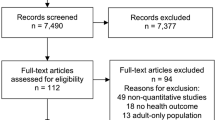Abstract
Among immigrant children whose parents have historically had lower education, the study explored which immigrant children were most likely to have coverage based on maternal region of origin. The direct and indirect relationship of acculturation on immigrant children’s coverage was also assessed. A subsample of US-born children with foreign-born mothers from the Early Childhood Longitudinal Survey-Kindergarten Cohort was analyzed using multinomial logistic regressions (n = 1,686). Children whose mothers emigrated from the Caribbean or Indochina had greater odds of being insured compared to children whose mothers emigrated from Mexico. Moreover, Latin American children did not statistically differ from Mexican children in being uninsured. Maternal citizenship was positively associated with children’s coverage; while living in a household with a mother who migrated as a child was negatively associated with private insurance. To increase immigrant children’s coverage, Latin American and Mexican families may benefit from additional financial assistance, rather than cultural assistance.
Similar content being viewed by others
References
Capps R, et al. The health and well-being of young children and immigrants. Washington, DC: Urban Institute; 2004. p. 1–42.
Lynch V, et al. Uninsured children: who are they and where do they live?. Washington DC: Urban Institute; 2010.
Guendelman S, Schauffler HH, Pearl M. Unfriendly shores: how immigrant children fare in the US health system. Health Aff. 2001;20(1):257–66.
Lessard G, Ku L. Gaps in coverage for children in immigrant families. Future Child. 2003;13(1):101–15.
Kaiser Commission on Medicaid and the Uninsured. The role of employer-sponsored health coverage for immigrants: a primer. Washington DC: Kaiser Commission; 2006.
Mohanty SA, et al. Health care expenditures of immigrants in the United States: a nationally representative analysis. Am J Public Health. 2005;95(8):1431–8.
Hernandez DJ. Demographic change and the life circumstances of immigrant families. Future Child. 2004;14(2):17–49.
Hernandez DJ, Charney E. From generation to generation: the health and well-being of children in immigrant families. Washington DC: National Academy Press; 1998.
Lara M, et al. Acculturation and Latino health in the United States: a review of the literature and its sociopolitical context. Annu Rev Public Health. 2005;26:367–97.
Institute for Health Policy Studies. Barriers to enrollment in healthy families and medi-cal: findings from focus groups of Chinese, Korean, and Vietnamese parents. San Francisco: University of California, San Francisco; 2000.
Perry M, et al. Medicaid and children: overcoming barriers to enrollment: findings from a national survey. Kaiser: Commission on Medicaid and the Uninsured, Washington DC; 2000.
Fremstad, S.: The INS public charge guidance: What does it mean for immigrants who need public assistance. 2000 [cited 2010 March 26]; Available from: http://www.cbpp.org/cms/index.cfm?fa=view&id=1550.
National Immigration Law Center: Questions and answers about “Public Charge”. 1999 [cited 2010 March 26]; Available from: http://www.nilc.org/immspbs/bu/ebupdate995.htm.
Akresh IR, Frank R. Health selection among new immigrants. Am J Public Health. 2008;98(11):2058–64.
Oza-Frank R, Stephenson R, Venkat Narayan KM. Diabetes prevalence by length of residence among US immigrants. J Immigr Minor Health. 2011;13:1–8.
Graham JW. Missing data analysis: making it work in the real world. Annu Rev Psychol. 2009;60:549–76.
Graham JW, Schafer JL. On the performance of multiple imputation for multivariate data with small sample size. In: Hoyle RH, editor. Statistical strategies for small sample research. Thousand Oaks, CA: Sage; 1999. p. 1–27.
Baron RM, Kenny DA. The moderator-mediator variable distinction in social psychological research: Conceptual, strategic, and statistical considerations. J Pers Soc Psychol. 1986;51(6):1173–82.
Sobel ME, Leinhardt S. Asymptotic confidence intervals for indirect effects in structural equation models. Sociol Methodol. 1982;13:290–312.
Newacheck PW, et al. Health insurance and access to primary care for children. N Engl J Med. 1998;338(8):513–9.
Brown ER, Yu H. Latinos’ access to employment-based health insurance. In: Suarez-Orozco MM, Paez MM, editors. Latinos: remaking America. Berkeley: University of California Press; 2002. p. 236–53.
Acknowledgments
Funding for this project was support by a grant from the Robert Wood Johnson Foundation New Connections program and a grant from the Eunice Kennedy Shriver National Institute of Child Health and Human Development (K12 HD055882) to the first author. In addition, funding for this project was support by a Young Scholar award from the Foundation for Child Development to the second author.
Author information
Authors and Affiliations
Corresponding author
Rights and permissions
About this article
Cite this article
Hernandez, D.C., Kimbro, R.T. The Association Between Acculturation and Health Insurance Coverage for Immigrant Children from Socioeconomically Disadvantaged Regions of Origin. J Immigrant Minority Health 15, 453–461 (2013). https://doi.org/10.1007/s10903-012-9643-1
Published:
Issue Date:
DOI: https://doi.org/10.1007/s10903-012-9643-1




